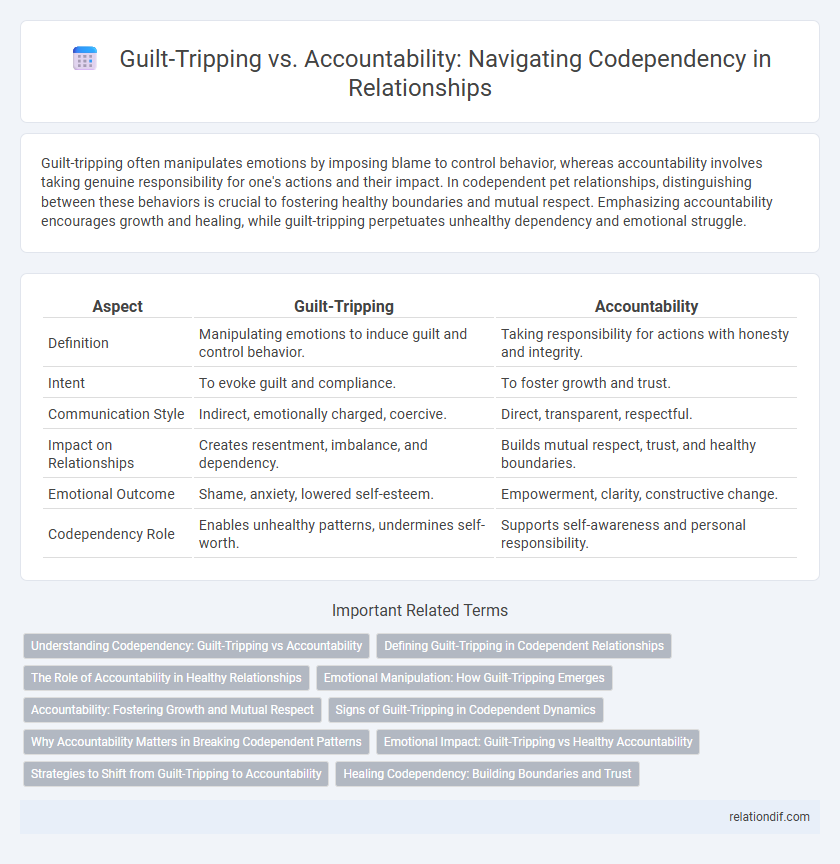Guilt-tripping often manipulates emotions by imposing blame to control behavior, whereas accountability involves taking genuine responsibility for one's actions and their impact. In codependent pet relationships, distinguishing between these behaviors is crucial to fostering healthy boundaries and mutual respect. Emphasizing accountability encourages growth and healing, while guilt-tripping perpetuates unhealthy dependency and emotional struggle.
Table of Comparison
| Aspect | Guilt-Tripping | Accountability |
|---|---|---|
| Definition | Manipulating emotions to induce guilt and control behavior. | Taking responsibility for actions with honesty and integrity. |
| Intent | To evoke guilt and compliance. | To foster growth and trust. |
| Communication Style | Indirect, emotionally charged, coercive. | Direct, transparent, respectful. |
| Impact on Relationships | Creates resentment, imbalance, and dependency. | Builds mutual respect, trust, and healthy boundaries. |
| Emotional Outcome | Shame, anxiety, lowered self-esteem. | Empowerment, clarity, constructive change. |
| Codependency Role | Enables unhealthy patterns, undermines self-worth. | Supports self-awareness and personal responsibility. |
Understanding Codependency: Guilt-Tripping vs Accountability
Understanding codependency requires distinguishing guilt-tripping, a manipulative tactic that exploits emotions to control others, from genuine accountability, which involves taking responsibility for one's actions without blame or manipulation. Guilt-tripping perpetuates unhealthy relational dynamics by fostering resentment and dependency, while accountability promotes emotional growth and balanced boundaries. Recognizing these differences helps break codependent patterns and supports healthier interpersonal relationships.
Defining Guilt-Tripping in Codependent Relationships
Guilt-tripping in codependent relationships involves manipulating a partner's emotions to control their behavior by inducing feelings of guilt or obligation. Unlike healthy accountability, which encourages responsibility and personal growth, guilt-tripping exploits vulnerability and fosters resentment. Recognizing this distinction is crucial for breaking the cycle of emotional manipulation and promoting balanced, respectful interactions.
The Role of Accountability in Healthy Relationships
Accountability in healthy relationships involves openly acknowledging one's actions and their impact without manipulation or blame, fostering trust and mutual respect. Unlike guilt-tripping, which leverages emotional coercion to control behavior, accountability encourages personal responsibility and constructive communication. This distinction promotes emotional growth and balanced dynamics essential for sustaining supportive and resilient connections.
Emotional Manipulation: How Guilt-Tripping Emerges
Guilt-tripping emerges as a form of emotional manipulation where one person exploits another's feelings of responsibility to control behavior or decisions. Unlike accountability, which involves genuine acknowledgment of actions and consequences, guilt-tripping distorts emotional responses to induce shame and compliance. This manipulative tactic often undermines healthy communication and perpetuates codependent dynamics by prioritizing control over mutual respect.
Accountability: Fostering Growth and Mutual Respect
Accountability promotes personal growth by encouraging individuals to take responsibility for their actions without manipulation or blame. It fosters mutual respect through honest communication and a commitment to resolving conflicts constructively. Embracing accountability helps break codependent patterns by empowering each person to contribute to a healthy and balanced relationship dynamic.
Signs of Guilt-Tripping in Codependent Dynamics
In codependent dynamics, guilt-tripping often manifests as persistent blame-shifting and emotional manipulation aimed at provoking feelings of obligation or remorse. Signs include exaggerated self-victimization, constant reminders of past favors or sacrifices, and using guilt to control decisions or behaviors. Recognizing these patterns is essential for distinguishing guilt-tripping from healthy accountability, which involves honest communication and mutual responsibility without emotional coercion.
Why Accountability Matters in Breaking Codependent Patterns
Accountability matters in breaking codependent patterns because it empowers individuals to take responsibility for their actions and emotions, fostering personal growth and healthier relationships. Unlike guilt-tripping, which manipulates and reinforces unhealthy dynamics, accountability promotes self-awareness and constructive change. Emphasizing accountability helps disrupt codependency by encouraging boundaries and emotional independence.
Emotional Impact: Guilt-Tripping vs Healthy Accountability
Guilt-tripping manipulates emotions by inducing unnecessary shame and anxiety, leading to decreased self-esteem and increased resentment. Healthy accountability focuses on honest communication and responsibility, fostering growth and emotional resilience without emotional harm. This distinction is crucial for maintaining balanced relationships and promoting mental well-being.
Strategies to Shift from Guilt-Tripping to Accountability
Shifting from guilt-tripping to accountability involves recognizing manipulative emotional triggers and setting clear personal boundaries to foster honest communication. Employing assertive language and focusing on specific behaviors instead of character judgments helps promote responsibility without inducing shame. Practicing self-awareness and encouraging empathy supports a constructive mindset, enabling healthier interpersonal dynamics and emotional growth.
Healing Codependency: Building Boundaries and Trust
Guilt-tripping often manipulates emotions to control behavior, undermining authentic accountability essential for healing codependency. Establishing clear boundaries fosters trust and self-respect, enabling individuals to take responsibility without emotional coercion. Building these skills promotes healthier relationships and supports sustainable recovery from codependent patterns.
Guilt-tripping vs Accountability Infographic

 relationdif.com
relationdif.com